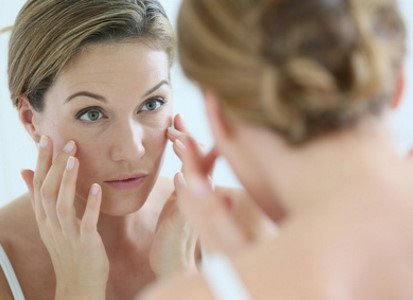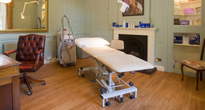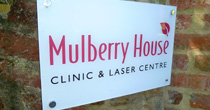
There are some factors that you can’t do anything about. These are the genetic influences that determine how your skin changes over time. So if your parents both had good skin then you may expect to inherit a predisposition to looking good as you age.
However, genetics are only part of the story.
External factors also play a vital role in how your skin ages that can make a huge difference beyond genetics. Lifestyle decisions that we make can make the skin age at a faster or slower rate due to the level of certain external factors.
- Sun exposure – it is now widely understood that sun exposure is a major factor in how the skin ages. Chronic sun exposure can cause lines and wrinkles to appear long before the ageing process, making a person look prematurely aged. In addition to the lines and wrinkles, other signs of ageing associated with sun exposure are spider veins, pigmentation problems and poor skin texture.
Conversely, wearing high protection SPF sunscreen and avoiding direct sunlight especially during peak times can make a noticeable difference. In Hollywood, it has become more socially acceptable to have quite pale faces due to avoiding the sun’s effects on the skin.
Did you know… it’s estimated that 90% of skin aging is due to the effects of the sun - Smoking – beyond the known health risks, smoking also causes the skin to gain an unhealthy complexion as well as premature wrinkles. Smoking reduces the supply of oxygen and nutrients to all the body and that includes the skin. Research has demonstrated that smokers have reduced collagen and elastin within the skin, which causes the skin to develop a looseness in its appearance.
Did you know… ’20 a day’ smokers look 20 years older – according to a study, smokers aged 40-49 who smoked 20 pack years or more (equivalent 20 cigarettes a day for a year) had the same amount of wrinkling and non-smokers aged 60-69 - Pollution – those that work in busy congested cities know that pollution can build up a layer of dirt and grime on the skin. Particles in the air emitted by exhaust fumes are invisible to the human eye, but once they settle on your skin and combine with makeup, moisturiser, natural oils and sweat; so that by the end of the day there is a noticeable amount to remove when you cleanse. Scientists theorise that certain chemicals and metals in polluted air could have an adverse impact on the skin.
Pollution can damaged the skin’s barrier function by breaking down collagen and the lipids contained within it. In addition, polluted air can cause sensitivity, irritation or rashes. The accumulation of particles on the skin contributes to blocked pores, which can lead to breakouts. - Beauty Sleep – the impact of sleep on your skin is no myth. Getting sufficient sleep is vital for the body’s functioning, helping metabolism and recovery processes to work productively.
If you don’t get enough sleep, then the body is not able to fully recover for the next day. The cumulative impact of insufficient sleep is often noticeable in a tired appearance, which includes the skin. You may notice lack of radiance and poor complexion. When you’re tired, the skin can lose its barrier function and is less able to retain moisture. You may also crave fatty or sweet foods, which also contribute to a deterioration in skin condition.
Research by UCLA found that just a single night of poor sleep was all it took to encourage cellular ageing in older adults. In another study, fine lines and uneven skin pigmentation were particularly visible among the group that had poorer quality and quantity of sleep.
So regular losing sleep or sleeping badly is bound to have evenmore of an impact.
While each factor alone can have an impact on the skin, when 2 or more of the factors combine, there will be a greater propensity to premature ageing and poor skin.
Helping to prevent skin ageing
While we can’t do much about genetics, understanding the external factors gives us an opportunity to help our skin ourselves.
Avoiding the external influences can have a positive impact on the skin regardless of genetics.
So a person with great genetics who smokes and sunbathes can still suffer premature ageing in the skin; while someone else can manage the impact of their genetic predisposition to earlier ageing by taking precautions in terms of their health and lifestyle.
For a person who is investing in non-surgical skin treatments, benefits will be enhanced by avoiding these 4 detrimental external influences.
Improving Premature Ageing
Non-Surgical Treatments
Now advanced skin treatment doctors are able to offer a number of anti-ageing treatments to improve the appearance of the skin. Use of injections, laser, IPL and radiofrequency can all help to reduce lines and wrinkles as well as improve the complexion and texture of the skin. Options include:
- Anti-ageing injections to smooth out lines and wrinkles
- Dermal fillers to tackle deeper creases and replenish lost volume
- IPL/laser to stimulate skin cell renewal
- LED treatment to promote healing and renewal
- ResurFX is a non-ablative photo-fractional skin resurfacing
- Tixel® Thermal Fractional Rejuvenation
- NEW Ultherapy Ultrasound Treatment
- ZO Skin Health cosmeceutical skincare has active ingredients to stimulate the skin
Mulberry House Clinic
Established 2003
Mulberry House Clinic has an excellent reputation in the Northampton area as an independent, doctor-led practice with over 17 years experience. Cosmetic skin treatments are carried out by Dr John Tanqueray, who works closely with leading manufacturers to remain at the forefront of the medical aesthetics.
For further information or to arrange a confidential consultation, please complete our contact form, call 01604 702630 or email: info@mulberryhouseclinic.co.uk.







